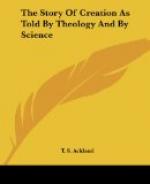1. When this record was committed to writing, language was in a very different condition from that in which it is now. We have an account of the first recorded exercise of the faculty of speech in Gen. ii. 19. Adam first used it to give names to all the living creatures as they passed in review before him. In accordance with this statement it appears, from the researches of philologists, that language in its earliest state was entirely, or almost entirely limited to words denoting sensible objects and actions. It seems probable that these names were derived from radicals expressing general ideas [Footnote: Max Muller’s Lectures on the Science of Language, First Series Lect. viii. ix.]; but there is reason to doubt whether these radicals ever had a formal existence as words—they seem rather to have been the mental stock out of which words were produced. But the human mind had from the first powers for the exercise of which this limited vocabulary was insufficient. Even in the outer world there was much which was the object of reason and inference rather than of sense, while the whole world of consciousness was entirely unprovided with the means of expression. To meet this difficulty words, which originally denoted objects of sense, were used figuratively to express ideas which bore some resemblance or analogy, real or fancied, to their original significance. As time passed on this difficulty was gradually diminished: synonyms crept into all languages from various sources, and when once adopted, they were in many cases gradually differentiated, the various senses which the original word had borne were portioned off among them, and increased precision was thus obtained.
But in the infancy of mankind the figurative system was in full operation. Hence, all early documents have a strong tinge of the poetic element. Poetry, strictly so called, probably had not as yet a separate existence; but the whole spoken and written language was permeated by that poetic spirit which delights in tracing subtle analogies, and in expressing the invisible by means of the visible. The translation of the Sanscrit Hymns, which has recently appeared [Footnote: Hymns of the Big Veda Sanhita, translated by Max Muller, vol. i.], furnishes a most valuable illustration of this state of thought and of language. These hymns are probably nearly coeval with the Pentateuch. They were the production of a different branch of the human family, and indicate a different tone of thought, but they bring out very clearly the figurative character of primitive language, abounding in fanciful descriptions of natural phenomena, which, when their metaphorical, character was forgotten, passed by an easy transition into the graceful myths and legends of early Greece.
Then there was a poverty in these primitive vocabularies even in reference to sensible objects, which in many cases rendered it necessary to employ the same word in more or less extensive significations, and in the Semitic languages the power of inflexion was in some directions very limited. This limitation is most remarkable in the forms used for the expression of time. One form alone was available to express those modifications which are indicated by the imperfect, perfect, pluperfect, and aorist tenses of the classical languages.




